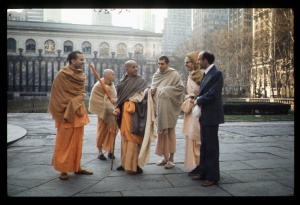SB 2.10.49-50

A.C. Bhaktivedanta Swami Prabhupada
TEXTS 49-50
- kṣattuḥ kauśāraves tasya
- saṁvādo 'dhyātma-saṁśritaḥ
- yad vā sa bhagavāṁs tasmai
- pṛṣṭas tattvam uvāca ha
- brūhi nas tad idaṁ saumya
- vidurasya viceṣṭitam
- bandhu-tyāga-nimittaṁ ca
- yathaivāgatavān punaḥ
SYNONYMS
kṣattuḥ — of Vidura; kauśāraveḥ — as that of Maitreya; tasya — their; saṁvādaḥ — news; adhyātma — in the matter of transcendental knowledge; saṁśritaḥ — full of; yat — which; vā — anything else; saḥ — he; bhagavān — His Grace; tasmai — unto him; pṛṣṭaḥ — inquired; tattvam — the truth; uvāca — answered; ha — in the past; brūhi — please tell; naḥ — unto us; tat — those matters; idam — here; saumya — O gentle one; vidurasya — of Vidura; viceṣṭitam — activities; bandhu-tyāga — renouncing the friends; nimittam — the cause of; ca — also; yathā — as; eva — also; āgatavān — came back; punaḥ — again (at home).
TRANSLATION
Śaunaka Ṛṣi said: Let us know, please, what topics were discussed between Vidura and Maitreya, who talked on transcendental subjects, and what was inquired by Vidura and replied by Maitreya. Also please let us know the reason for Vidura's giving up the connection of his family members, and why he again came home. Please also let us know the activities of Vidura while he was in the places of pilgrimage.
PURPORT
Śrī Sūta Gosvāmī was narrating the topics of the creation and destruction of the material world, but it appears that the ṛṣis headed by Śaunaka were more inclined to hear of transcendental subjects, which are on a higher level than the physical. There are two classes of men, namely those too addicted to the gross body and the material world, and others, on the higher level, who are interested more in transcendental knowledge. Śrīmad-Bhāgavatam gives facility to everyone, both to the materialist and to the transcendentalist. By hearing Śrīmad-Bhāgavatam in the matter of the Lord's glorious activities both in the material world and in the transcendental world, men can derive equal benefit. The materialists are more interested in the physical laws and how they are acting, and they see wonders in those physical glamors. Sometimes, due to physical glamors, they forget the glories of the Lord. They should know definitely that physical activities and their wonders are all initiated by the Lord. The rose in the garden gradually takes its shape and color to become beautiful and sweet not by a blind physical law, although it appears like that. Behind that physical law is the direction of the complete consciousness of the Supreme Lord, otherwise things cannot take shape so systematically. The artist draws a picture of a rose very nicely with all attention and artistic sense, and yet it does not become as perfect as the real rose. If that is the real fact, how can we say that the real rose has taken its shape without intelligence behind the beauty? This sort of conclusion is due to a poor fund of knowledge. One must know from the above description of creation and annihilation that the supreme consciousness, being omnipresent, can take care of everything with perfect attention. That is the fact of the omnipresence of the Supreme Lord. Persons, still more foolish than the gross materialists, however, claim to be transcendentalists and claim to have such supreme all-pervading consciousness, but offer no proof. Such foolish persons cannot know what is going on behind the next wall, yet they are falsely proud of possessing the cosmic, all-pervading consciousness of the Supreme Person. For them also, hearing of Śrīmad-Bhāgavatam is a great help. It will open their eyes to see that simply by claiming supreme consciousness one does not become supremely conscious. One has to prove in the physical world that he has such supreme consciousness. The ṛṣis of Naimiṣāraṇya, however, were above the gross materialists and the false transcendentalists, and thus they were always anxious to know the real truth in transcendental matters, as discussed by authorities.